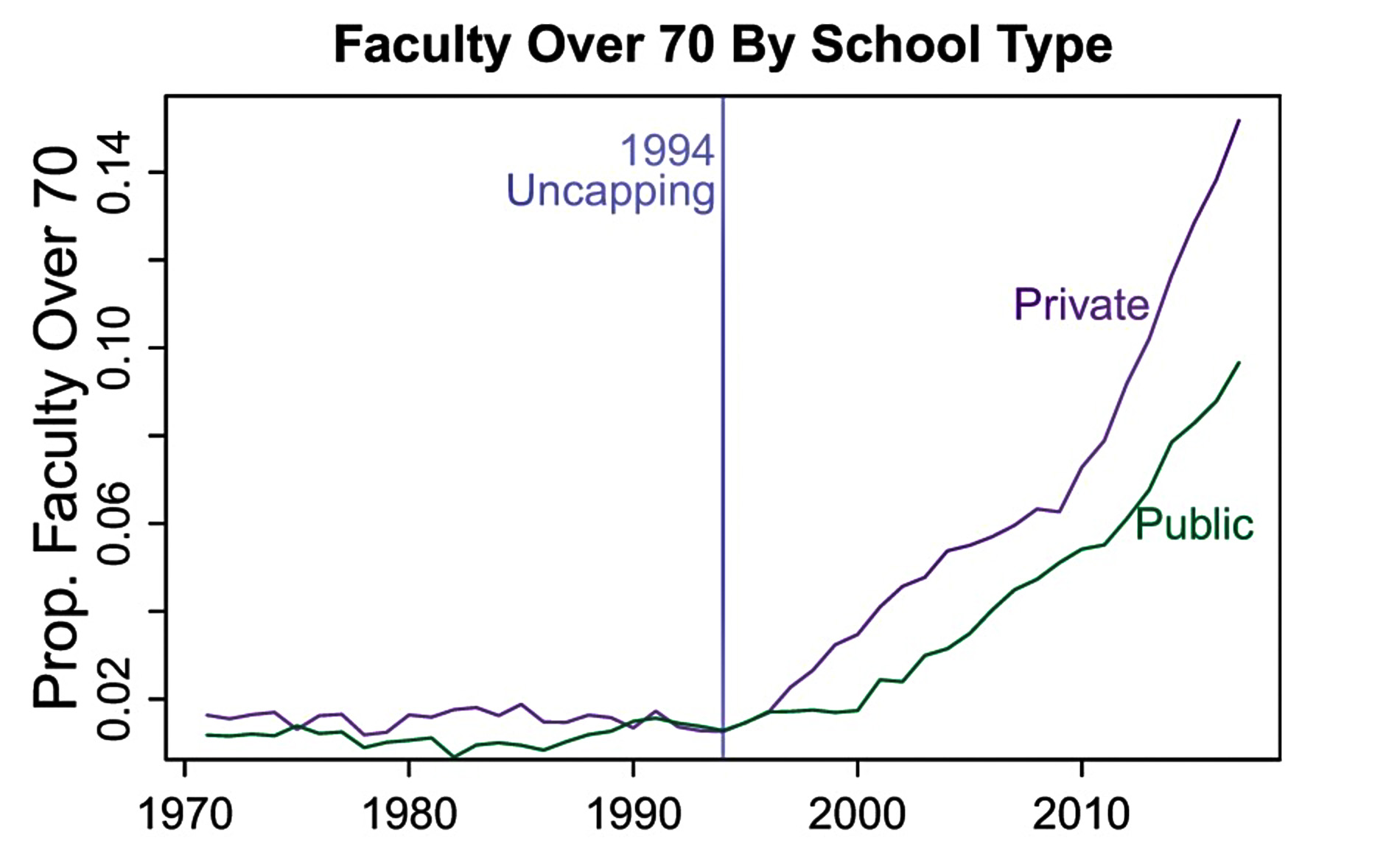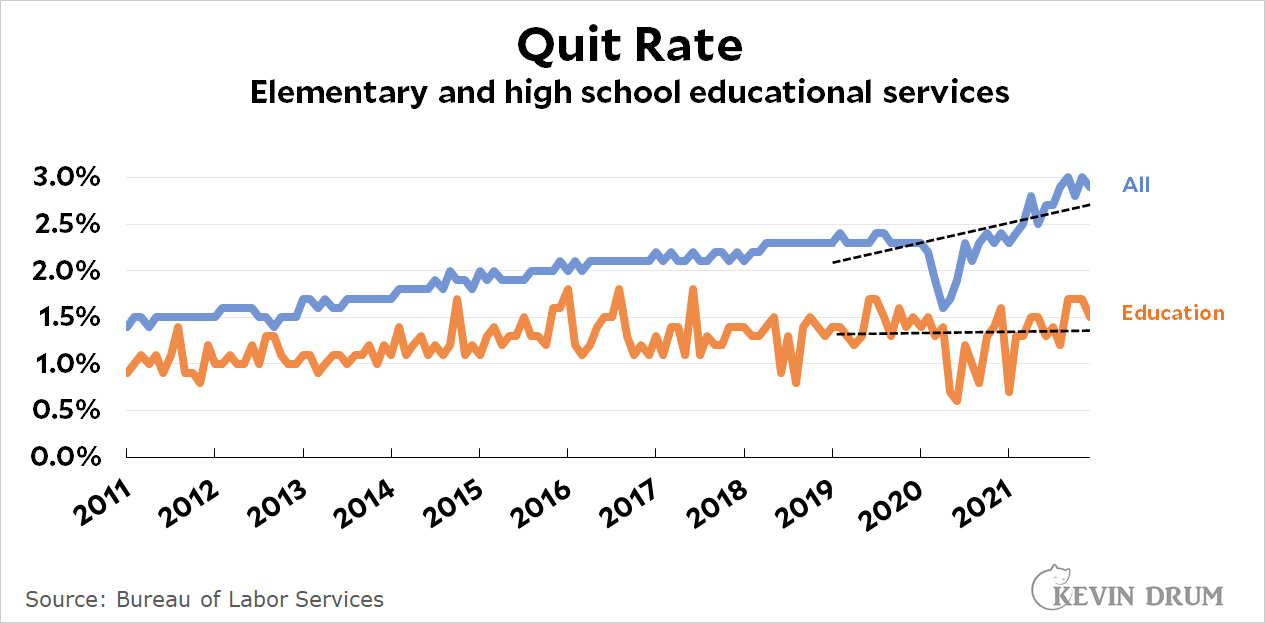Until 1994, most law schools enforced mandatory retirement at age 70. When Congress made that illegal, here's what happened:
 Is 70 the new 60? Or has a new gerontocracy taken over our law schools? And if it has, what effect do you think that's had?
Is 70 the new 60? Or has a new gerontocracy taken over our law schools? And if it has, what effect do you think that's had?
Cats, charts, and politics

Until 1994, most law schools enforced mandatory retirement at age 70. When Congress made that illegal, here's what happened:
 Is 70 the new 60? Or has a new gerontocracy taken over our law schools? And if it has, what effect do you think that's had?
Is 70 the new 60? Or has a new gerontocracy taken over our law schools? And if it has, what effect do you think that's had?
A billion here, a billion there:
California bullet train officials on Tuesday released a new draft project blueprint that acknowledges that costs have risen roughly $5 billion but seeks to address several issues that have generated blowback.
The 2022 business plan estimates that the full, 500-mile, high-speed system between Los Angeles and San Francisco will cost as much as $105 billion, up from $100 billion two years ago. In 2008, when voters approved a bond to help build the railroad, the authority estimated that the system would cost $33 billion.
At this rate, it will end up costing about $200 billion by the time it's finally finished in 2040 or so. Assuming it's ever finished, of course, which is pretty unlikely at this point. By 2030 we'll have a nice, fast train from Bakersfield to Merced that no one will use, and that will be about it. Hooray for California.
This is Captain Everest of the Cajun Encounters Tour Company, the guy who piloted me around Honey Island Swamp, home of alligators and raccoons. He had a very Jungle Cruisey patter worked up, which everyone seemed to enjoy. I'm sort of agnostic about that, but there's no question that this swamp provided me with more good pictures than any of the others.

Off the top of my head, since the year 2000 the United States has done the following big things:
Obviously this list depends on my definition of "big." And it's not limited to legislation. Nor is it limited just to things I like.
What's the point of this? Nothing much, really. It just seems like a surprisingly long list for a fragile, gridlocked, polarized, democratically declining nation. Am I wrong?
NOTE: The list is approximately chronological, but it's also numbered so you can argue about stuff more efficiently in comments.
The Washington Post reports that a few members of the military are unhappy with the way the White House handled the Afghanistan withdrawal:
Senior White House and State Department officials failed to grasp the Taliban’s steady advance on Afghanistan’s capital and resisted efforts by U.S. military leaders to prepare the evacuation of embassy personnel and Afghan allies weeks before Kabul’s fall, placing American troops ordered to carry out the withdrawal in greater danger, according to sworn testimony from multiple commanders involved in the operation.
....Military personnel would have been “much better prepared to conduct a more orderly” evacuation, Navy Rear Adm. Peter Vasely, the top U.S. commander on the ground during the operation, told Army investigators, “if policymakers had paid attention to the indicators of what was happening on the ground.” He did not identify any administration officials by name, but said inattention to the Taliban’s determination to complete a swift and total military takeover undermined commanders’ ability to ready their forces.
First off, this is part of a 2,000-page report, and I'm surprised this is the worst anyone can say. There are no specifics, and no names named, just a few commanders who think we should have started the withdrawal earlier.
If I were in the Army, that's exactly what I would think too. But the White House and the State Department didn't have it that easy. On the one hand, yes, it was pretty obvious what was happening. Operationally, there's no question that we should have allowed things to begin earlier
On the other hand, doing so would have been tantamount to giving up. We had promised President Ashraf Ghani that we would back him to the end, and beginning evacuations earlier would have undermined that. It would have made it obvious that we had no faith in either him or Afghan troops.
In other words, this was not an easy choice. Do we do what's in our best interest or do we live up to our promises? Does it make a difference that Ghani had pretty obviously not lived up to his? Do we evacuate embassy personnel for their own safety, or do we keep them in country because they're needed to do the very thing the Army wants: continue work on emergency visas for Afghan allies?
This was pretty obviously a no-win situation. It's easy to criticize the decisions the White House eventually settled on because we know how they turned out. But what if we'd done what some of those military commanders wanted? I suspect that things would have turned out even worse, but that's just speculation. We'll never know.
In any case, out of 2,000 pages I sure hope there's more dirt than this. If not, this was a pretty spectacularly successful operation.
Crime is a pursuit of the young. The prime years for both property and violent crime are the late teens and early twenties, and by age 30 it drops off dramatically.
At least, it used to. Rick Nevin passes along an interesting chart that shows what happened after lead poisoning in toddlers was cut way down:
 Back in the bad old days, property crime rates skyrocketed among the young. The peak was at age 18 and it was 3x higher than the rate at age 30.
Back in the bad old days, property crime rates skyrocketed among the young. The peak was at age 18 and it was 3x higher than the rate at age 30.
But the light blue line shows what that looks like today. Property crime goes up in the late teens, and it peaks at age 19. But not only is that peak far lower than it used to be, it's also nearly the same as it is at age 30. There's no more age-crime curve.
The same is true of violent crime, though a little less dramatically. Today's 19-year-olds are two-thirds less violent than they used to be and no more violent than an average 30-year-old.
The role of lead in all this is interesting, of course, but beyond that I'm not sure what to make of it. I guess one thing, though, is that people should stop being so afraid of young men. They are far less prone to both violent and property crime than in the past, and they aren't uniquely violent compared to other age groups. They're just another demographic.
My latest M-protein results are up slightly from the previous month:
 We cut back the dose of the chemo drug a bit, so it's no surprise that the M-protein number continues to rise slightly. Hopefully it will stabilize soon.
We cut back the dose of the chemo drug a bit, so it's no surprise that the M-protein number continues to rise slightly. Hopefully it will stabilize soon.
Unfortunately, a bigger immediate problem is that my white blood count has been steadily dropping and is now well below where it should be:
 Since August, my WBC has dropped from around 4.0 to 2.0. Obviously that's not good, though it doesn't present any immediate problems. It's just a bad trend.
Since August, my WBC has dropped from around 4.0 to 2.0. Obviously that's not good, though it doesn't present any immediate problems. It's just a bad trend.
Both of these results are from last week, and I'll get new labs done this week. There's a sort of dance here where we try to get the best combination of good cancer fighting without wrecking my immune system. Depending on what the new labs show, we might experiment with different dosages or different chemo cycles to see what works best. And if that doesn't do the job, it will be time to switch chemo meds.
It's lotsa fun being a human guinea pig.
Axios reports that our schools are in crisis:
Teachers are leaving the education workforce at a rapid clip, according to new LinkedIn data.
Staggering stat: Rates of attrition among educators is 66% above pre-pandemic levels.
Axios then offers to "go deeper" if you click the link. But don't worry: they assure us that going deeper will take only one minute.
But as always, I was curious. I'm sure that LinkedIn is the very gold standard of employment surveys, but the Bureau of Labor Statistics has been tracking hires and quits in various occupations for decades via their JOLTS survey. And it will take less than a minute to look at their data:
 The trendline above the blue data shows quits for all workers since the year before the pandemic. The orange line does the same for education workers. As you can see—in mere seconds!—the top line has been trending sharply upward since 2020. Education workers, however, aren't quitting in high numbers. Their trendline is dead flat.
The trendline above the blue data shows quits for all workers since the year before the pandemic. The orange line does the same for education workers. As you can see—in mere seconds!—the top line has been trending sharply upward since 2020. Education workers, however, aren't quitting in high numbers. Their trendline is dead flat.
Now, "educational services" includes principals, teachers, and teacher assistants. Teachers make up about two-thirds of that. So it's possible that teachers really are quitting in huge numbers, but principals and teacher assistants are sitting tight and bringing the quit average down. Anything is possible. But I wouldn't put much stock in that particular possibility.
But maybe retirements are up? Nope. That's included under "other," and it's too small to even show up on the chart.
So that's that. I'm not an expert in interpreting JOLTS data, and if anyone wants to rip me a new one because they think I got this wrong, that's fine. But only if you're an expert!
This iconic tower is part of the Building Formerly Named After Rufus Bernhard von KleinSmid on the USC campus in Los Angeles. KleinSmid, like Caltech's Robert Millikan, was affiliated with the eugenics movement in the 20s and 30s and had to go.
It has been renamed the Dr. Joseph Medicine Crow Center for International and Public Affairs. Medicine Crow received a masters degree in anthropology from USC in 1939.
This picture was taken minutes before the tower went into shadow at sunset while the light was at its ruddiest. The red brick doesn't quite glow, but it comes close.

Let's talk about Joe Manchin and his role in the failure of President Biden's BBB bill.
There's no question that Manchin played a role. He's a conservative Democrat who just wasn't up for spending $6 trillion or $3 trillion or whatever number was on the table at various times. He wanted something on the order of $1.5 trillion, and like many liberals I think it's a little dumb to pick a spending number out of a hat and try to fit programs into it, rather than the other way around. Nonetheless, that's the playing field we were on.
And Manchin was pretty clear about this. He had a written agreement with Chuck Schumer about the number. He told Biden this was the number. There was never really any doubt that this was his line in the sand.
So what programs did Manchin want to fit into that number? The answer is that he was flexible, but he had a few hot buttons. He wasn't happy with a no-strings-attached Child Tax Credit. He wanted to make sure climate change spending didn't hurt West Virginia coal miners. He wanted a few programs that were permanently funded rather than lots of programs that were only partially funded.
And it turns out that while he was fairly clear about this for months, White House staffers kept trying to go behind his back even after he felt like he'd reached a deal in principle. Whether Biden knew about this is still an open question.
Long story short, Manchin unquestionably wanted to cut BBB substantially. Beyond that, however, reporting over the past couple of months has persuaded me that he mostly acted decently in pursuit of that goal. You can disagree with him, as I do, but he didn't lie or deceive or backstab anyone. That happened more on the other side.
A lot of what happened was behind closed doors, so I can't say for sure that this is really how things went down. But it's my best guess at the moment. Manchin was a relatively reliable negotiating partner, and if we're going to give BBB another try this year he ought to be treated as one.